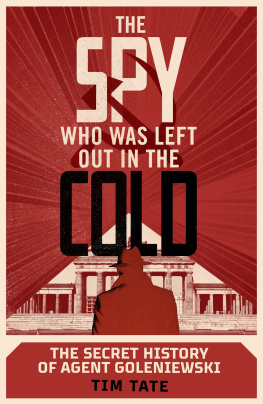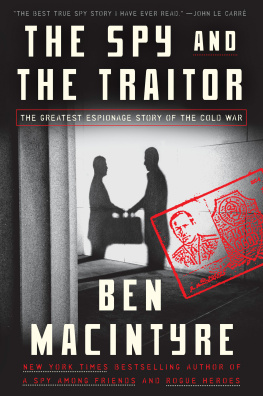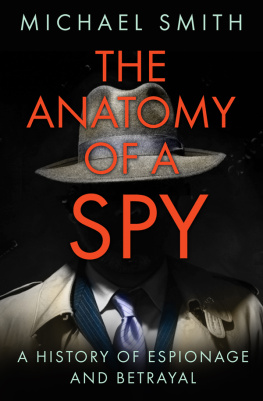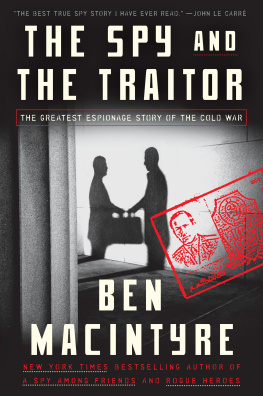THE ANATOMY OF A TRAITOR
A HISTORY OF ESPIONAGE AND BETRAYAL
MICHAEL SMITH

CONTENTS
Guide
It is possible to hate treason without making a caricature out of a traitor.
Robert Cecil, Personal Assistant to C, the Chief of SIS, 19431945.
INTRODUCTION
WHY SPIES SPY
Why did she betray him?
That most masculine of questions has been a dominant theme for storytellers ever since the ancient biblical tale of Samson and Delilah the latter someone whose name has become so associated with betrayal that it is even now frequently used to describe a woman who has been unfaithful to her husband or lover. The adulteress terrified male-dominated society. The cuckold was a laughing stock. Stories set around the activities of an unfaithful wife evoked an irresistible mix of sex and horror for the male reader, while creating a disquieting sense of female empowerment. This fascination with female sexual betrayal has been a dominant theme of such literary classics such as Madame Bovary, Anna Karenina, Ulysses and Lady Chatterleys Lover.
But while Delilah has come to epitomise female sexual infidelity, her betrayal of Samson had nothing whatsoever to do with adultery. Her actions were those of a spy, an enemy agent inside the unsuspecting heros camp. She exploited her sexual power over Samson to destroy him at the behest of Israels enemy, the Philistines, repeatedly using the post-coital slumber induced by their lovemaking to test ways of rendering him helpless. Samson was so hopelessly in love with her, or more likely so possessed by lust, that he failed to realise what was happening and eventually admitted that if his hair were shaved off he would lose his strength and become just like any other man. Delilah duly made love to him one more time, and when he fell asleep she had his hair cut off before handing him over to the Philistines in what is still seen as one of the greatest betrayals in history.
So why did she betray him?
The Book of Judges says that every one of the Philistine leaders promised to pay her 1,100 pieces of silver. This would have been a substantial sum and a considerable financial inducement to betrayal. Money is often a factor in agent motivation, but it is rarely the only one. Here was a man, and a powerful one not just a legendary strongman in the tradition of Heracles or Goliath, but the Jewish leader, who according to the Bible judged Israel for twenty years. He had fallen in love with Delilah. He could have transformed her life. Yet her loyalty to him was not so deep that it prevented her from betraying him. The Bible tells us very little about their relationship or Delilah herself, but it says enough to provide some clues as to other possible motives for the betrayal.
It might simply be that her loyalty was to the Philistines and not to Israel. She lived in the Valley of Sorek, west of Jerusalem, which formed the boundary between the coastal strip controlled by the Philistines and the lands of Israel. Samson is known to have had a penchant for Philistine women, so it seems reasonable to assume that the writer of the very moralistic tale of Samson's downfall would have emphasised her ethnic origins if she had been Philistine. Nevertheless, people living in areas separating warring communities frequently suffer at the hands of one side or the other. Revenge is one of the most powerful motives for any agent. Had Delilah or her family suffered ill by the Israelites? Any examination of her motives would need to investigate the possibility that she was already a supporter of the Philistines, perhaps under their control from the start of the relationship, and had been instructed by them to seduce Samson.
Even if their relationship was a genuine love affair, there is a strong suggestion that she was either trying to gain control over him or testing him. Did this powerful man really love her or was he just using her? She asked him three times how he could lose his strength and each time he fed her a different line. She bound him with green tree stems, new ropes and even plaited locks of his hair. All of these failed. Could he really be in love with her if he would not tell her the truth?
How canst thou say, I love thee, when thine heart is not with me? she complained. And so it came to pass, when she pressed him daily with her words, and urged him, that his soul was vexed unto death, that he told her all his heart.
Money, tribal loyalty, revenge, control or doubt over his sincerity. There are any number of possible reasons for Delilahs betrayal of Samson, of which those silver pieces are only the most obvious. The Philistines money gave her a powerful motive but it is unlikely to have been her sole reason. The one thing that is clear is that the reason she succeeded was her sexual power over Samson.

If Delilah was one of the first spies, how does her modern fictional counterpart James Bond compare? The intelligence services repeatedly claim that the work of the real spies is nothing like that portrayed in the films. James Bonds escapades for the British Secret Intelligence Service (SIS), better known as MI6, have blurred the images between fact and fiction. SIS chiefs insist that most intelligence officers sit behind desks, never using a gun and certainly not living a life of glamour, seducing foreign spies and drinking cocktails (whether shaken or stirred). While this is to a large extent true, at one level it is misleading. SIS intelligence officers who need weapons training are taught how to use small arms by a former special forces warrant officer based at their Fort Monckton training base in Hampshire and, given that they have to run agents in very difficult situations, in dangrous areas such as Libya, Syria, Iraq or Afghanistan, this is scarcely surprising.
MI6 officers certainly do not routinely carry weapons, one former senior SIS officer said. But there is a difference between, for instance, an officer working under diplomatic cover, who would not be armed, and one employed on a particular operation which may or may not involve an element of risk. Just because you were taking part in an operation you wouldnt necessarily say: Oh, I must go to the safe and get out a gatt [gun]. But where there is some likelihood of weapons being needed, given the proper authorisation, they are available.
Whatever his bosses might say, James Bond still has recourse to a gun and, when operating on the front line, he retains a licence to kill. All of the worlds leading foreign intelligence services employ special teams who carry out difficult operations such as protecting intelligence officers making contact with people whose reliability has not been tested, exfiltrating agents, or removing captured material and equipment from enemy territory.
Nevertheless, even in a war zone, the intelligence officer is only rarely carrying out the spying. That is the job of the agent. There is a key difference between officers and agents. Unlike officers, agents are not on the staff of the intelligence service; they are recruited by an individual officer for a specific role. It might be because they have direct access to the intelligence that is being sought, such as a traitor inside the target country or organisation, or because for some reason they have access to a region where the intelligence officer cannot operate, such as a businessman selling his wares in a country like North Korea, which it is difficult for westerners to visit. They might have a specific skill that is needed to acquire the intelligence, such as the local knowledge and linguistic ability to impersonate an insider. It is these agents, and only rarely the intelligence officers themselves, who are the real spies.












